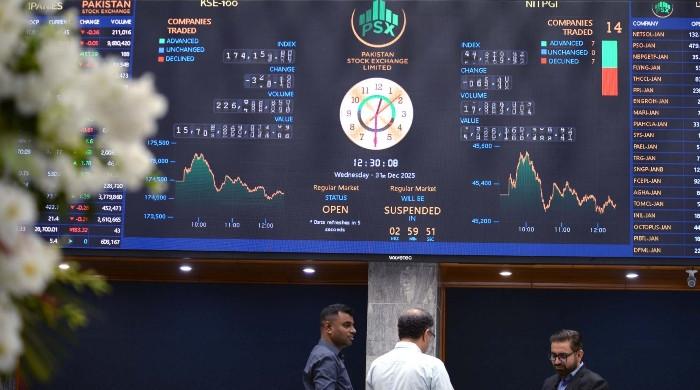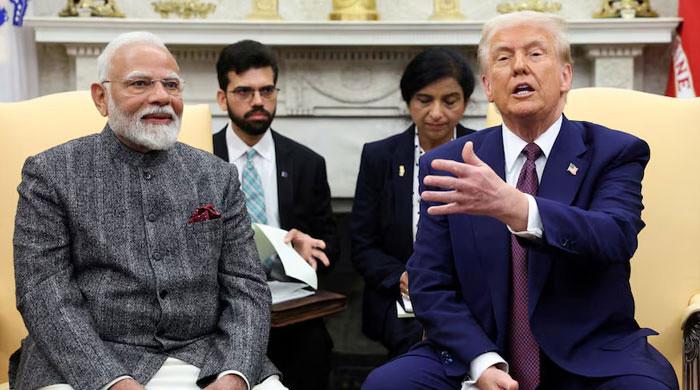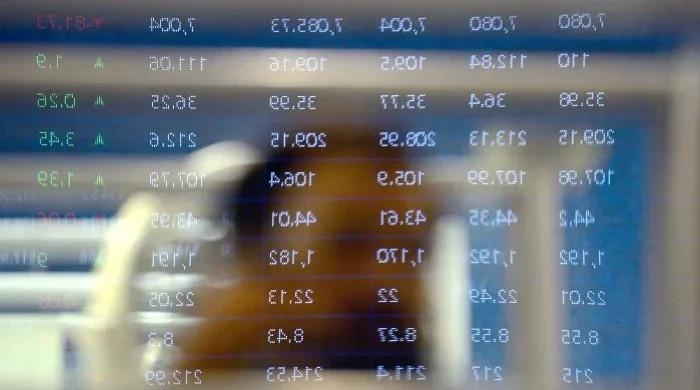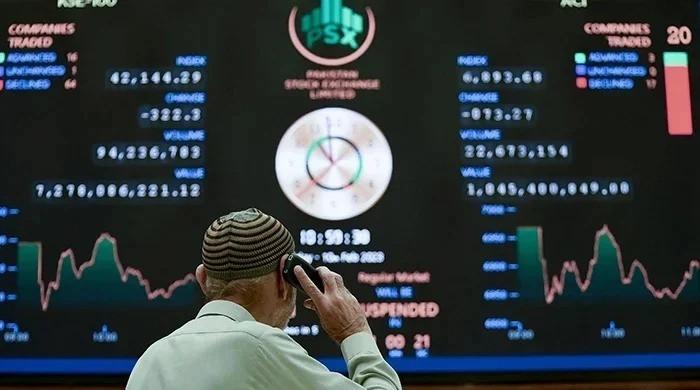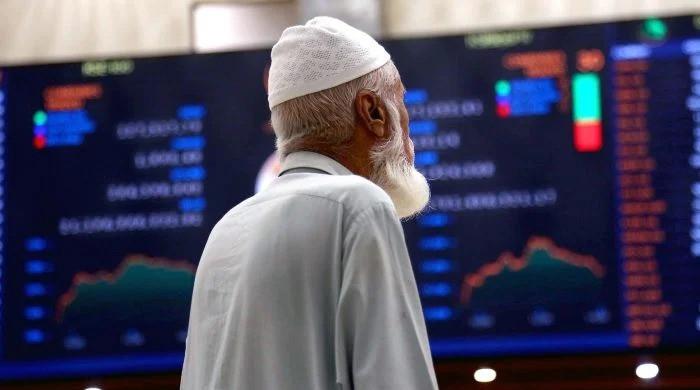Pakistan-IMF talks: Fund agrees on relief for poor through BISP, say officials
Pakistan, IMF have started the toughest ever parleys to break deadlock with the mission
January 31, 2023
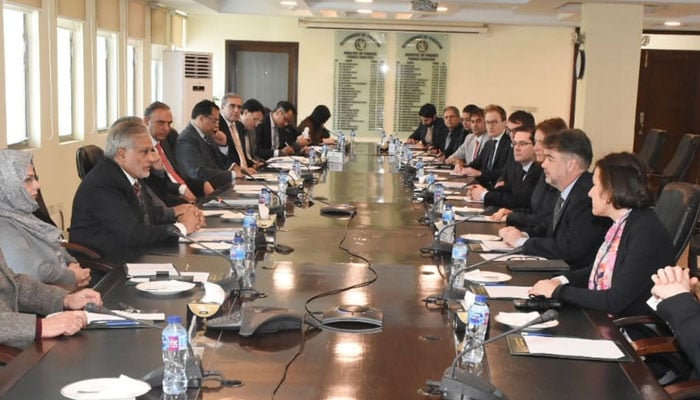
- Finance Minister Ishaq Dar receives IMF mission chief Nathan Porter.
- The IMF’s review mission had arrived in Islamabad a day earlier.
- Pakistan expected to share its plan for additional taxation measures.
ISLAMABAD: The International Monetary Fund (IMF) Tuesday agreed to allow Pakistan to provide relief to the poor segment of society through the Benazir Income Support Programme (BISP), but in the same breath laid utmost emphasis on “strict adherence” to financial discipline.
IMF's review mission is in Pakistan for technical and policy level discussions to revive the $7 billion Extended Fund Facility stalled for months.
During the first session today, the IMF’s review mission, headed by Nathan Porter, identified the budget deficit and slippages, reiterating its strict stance on implementing the conditions laid forth by the lender.
Finance Minister Ishaq Dar is leading the Pakistani side as the cash-strapped nation launches renewed efforts to complete the pending ninth review.
Analysts have termed the technical level talks the "toughest" ever as the Fund has refused to relax its conditions set for the revival of the loan facility.
Pakistan is gripped by a major economic crisis, with the rupee plummeting, inflation soaring and energy in short supply. The government of Prime Minister Shehbaz Sharif, fearful of backlash ahead of general elections, resisted tax hikes and subsidy removal as demanded by the IMF.
But in recent days, with the prospect of national bankruptcy looming and no friendly countries willing to offer bailouts, Islamabad agreed to swallow the bitter pill.
The government loosened control on the rupee to rein in a rampant black market in US dollars, a step that caused the currency to plunge to a record low. A sudden increase in prices of petroleum products is also a result of the IMF conditions.
The two sides, on the first day of the technical talks, reviewed the economic situation of Pakistan and the ninth review of the bailout programme — which is pending since September.
According to information available with Geo News, the mission review did not raise an objection to Pakistan’s desire to provide subsidies to the low-income segment of the country — which is reeling with rising inflation and aftershocks of the devastations caused by the cataclysmic floods that affected 33 million people.
The Fund’s mission also agreed with Islamabad’s request to continue providing relief under BISP.
Dar also briefed the mission on fiscal and economic reforms and measures being taken by the government in different sectors including bridging the fiscal gap, exchange rate stability and in the energy sector for the betterment of the economy, the statement released by the Ministry of Finance read.
He also apprised the delegation that reforms were being introduced in the power sector and that a high-level committee had been formed for devising modalities to eliminate the menace of circular debt in the gas sector.
Sources told Geo News that the Fund insisted Pakistan fulfil promises made by the coalition government in its federal budget for the fiscal year 2022-23, which include:
- Budget deficit should be maintained at 4.9%.
- Primary deficit should clock in at 0.2% of the GDP.
- Rs1,100 billion subsidy exemption for export sector should be removed.
- FBR’s tax collection target of Rs7,470 billion should be met.
- Circular debt should be reduced substantially.
- Rs855 billion collection target from petroleum levy should be met.
- Performance of state-owned entities should be improved to reduce their losses.
- Privatisation programme should be implemented.
The sources added that Pakistan promised the Fund that it would fulfil all the conditions; however, it requested the Washington-based lender to grant more time to implement the promises it had made.
The IMF mission chief expressed his confidence that the Pakistan government would meet the IMF requirements for the completion of the ninth review and hoped that Pakistan would continue towards its progress on the reforms in various sectors and complete the IMF programme within time effectively.
"The IMF and Pakistan will be working together on fiscal reforms," he said.
IMF resident representative Esther Perez Ruiz, Minister of State for Finance and Revenue Dr Aisha Ghous Pasha, SAPM on Finance Tariq Bajwa, SAPM on Revenue Tariq Mehmood Pasha, State Bank of Pakistan Governor Jamil Ahmed, secretary finance, chairman FBR, members of IMF delegation and senior officers from Finance Division also attended the meeting.
IMF is asking govt to fill Rs600bn gap on fiscal front
The Washington-based lender is suggesting the toughest prescriptions on all fronts of the economy at a time when the foreign exchange reserves are persistently on the decline and have touched the alarming level of $3.6 billion.
Although, the government had already implemented two major conditions including allowing adjustment of the rupee against the dollar and hiking petroleum prices to record levels ahead of the ongoing talks.
The IMF is asking the government to fill the yawning gap of Rs600 billion on the fiscal front through additional taxation measures or cutting down on expenditures in order to restrict the budget deficit and primary deficit within the desired limits.
Differences persisted over the exact fiscal gap and both sides will hold parleys to evolve consensus over the exact estimates for taking additional taxation measures through the upcoming mini-budget.
Pakistan and the IMF will hold technical and policy-level talks from today to Friday and then the policy-level talks will commence finalising the Memorandum of Financial and Economic Policies (MEFP) document.
The IMF further demanded an increase in electricity tariff within the range of Rs12.50 per unit as Islamabad seemed to agree to hike the electricity tariff of Rs7.50 per unit in a staggered manner.
The government may have agreed to withdraw the un-targeted subsidies of the electricity and gas sector to powerful groups in the upcoming parleys with the IMF. The gas tariff will also be hiked in the range of 74% for consumers.
“We will have to swallow bitter pills because the gap widened so much that now the economy cannot run with the approach of status quo. The country’s middle class will have to face the burden," top official sources stated while talking to a select group of reporters on Monday night.
"We have made a plan to protect vulnerable and poor segments of the society while implementing the IMF conditions,” they added.
— With additional input from AFP





